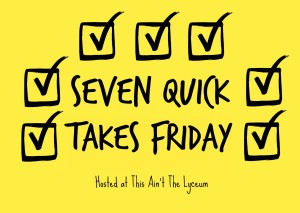
Hat tip/credit to the USCCB.
Let’s get this week really underway! (If you’d like a primer on NFP, explore the links provided by the USCCB.)
A couple of years ago I decided to recognize NFP Awareness Week with some regular posts. I’ll try to tag them so you can look them up (and honestly, I need to review what I’ve already said!).
Today I wanted to bring back one of my personal favorite categories, Modern Media Meditation. Considering myself musically Ignatian, I most often and profoundly experience God in music. And believe it or not, some of the principles of NFP are preached in music. That you hear on the radio! No need to wade through the one generic Christian rock station or break out Matt Maher CDs, unless you’d like to.
“All of Me” by John Legend. For our first dance, PJ and I swayed and twirled to young singer Jasmine Thompson’s cover.
Many posts ago, I analyzed the lyrics to the song, with maybe just a hint of an idea that perhaps it could be used for my very own marriage! If someone knows of a version with male and female voices, please let me know, so it can be my new favorite thing. To further connect the words to NFP, especially the lovely theme devised by the USCCB:
- Love: Not just the passionate, romantic kind (eros) the singer feels for the beloved, but the sacrificial (caritas/agape) kind: “Even when I lose, I’m winning.” Something I could only superficially understand before marriage and living the practice out–“NFP entails loving sacrifice”–I am now experiencing more deeply. Think of any hard part of NFP and that you were losing–the idea is to have the grace to see you’re actually winning, because what you have given up was out of love for the other. And that is “winning.”
- Mercy: This virtue is showing compassion, to “feel with.” Despite the beloved’s “imperfections,” or the “world beating you down,” the singer loves the person totally and completely. To me, the latter lyric could signify our sinful nature in this fallen world. And NFP in practice does still offer a channel for evil to enter in. What couples have to do (and what PJ and I are striving to live out) is be merciful to one another when he/she struggles, and like God, love anyway–and use that love to “show us still a better way.”
- Life: Okay, this is a little bit of a stretch, because nothing in the song talks about creating a life together. HOWEVER, the singer repeatedly mentions giving his/her “all” to the other, as does the beloved reciprocate. In NFP, you are giving all of yourself, including your potential fertility. When you’re both “showing hearts” (just what shape do you think some NFP charts use to indicate intercourse?), you’re showing openness to each other, but also a child.
And just because there has to be some humor, some choice lyrics are “You’re crazy and I’m out of my mind.” Relying on (a very effective) method of spacing or achieving pregnancy that relies on discernment is a very radical act in today’s culture, and given some of the practice’s idiosynchrosies, a little intimidating. Also, “Risking it all, though it’s hard.” I will always be honest. Before marriage, I could point to forums, articles, “experts” and say, “Let’s not be naive. This is hard.” Now I can say, “Yup! I was right.” Sometimes it is a challenge, and you’re feeling like you are taking a risk. But the point is you do it anyway. Not because you’re lazy. Not because some old man in a funny hat told you you had to or else hell. But because you want to. Because you see it as an act of love.
Some other examples:
- “Take Me the Way I Am” by Ingrid Michaelson. The sentiment of accepting a person the way she is–you know, a person with the gift of potential fertility (or with challenges)–is clear. The line about Rogaine is unfrotunate, BUT the rest of the singer’s reciprocity is about small acts of care, especially the physical. NFP is all about honoring and caring for your beloved’s body.
- “Stand by You” by Rachel Platten. While not an obvious choice, this song captures the commitment, even in the most difficult times, a beloved feels for the other. I hear elements of sacrifice and mercy (“I’ll walk through hell with you”) and charity (“Take my [wings] so yours can open to”). NFP involves a deep commitment for spouses, and depending on your discernment, can have its “heavens” you can’t find, and its hells that maybe you find yourselves in. Not to mention that the teaching of why NFP is an approved practice is based on Truth, and living it out requires faith.
What songs have you heard lately that might apply? Which lyrics will see you through your journey?
Oh, and I want to shout out to the blogger and author who really “sold” me on NFP. Simcha Fisher is running a contest for SIX ClearBlue fertility monitors all week. You can use this trusty device as part of a sympto-hormonal method of NFP to achieve or postpone pregnancy.










